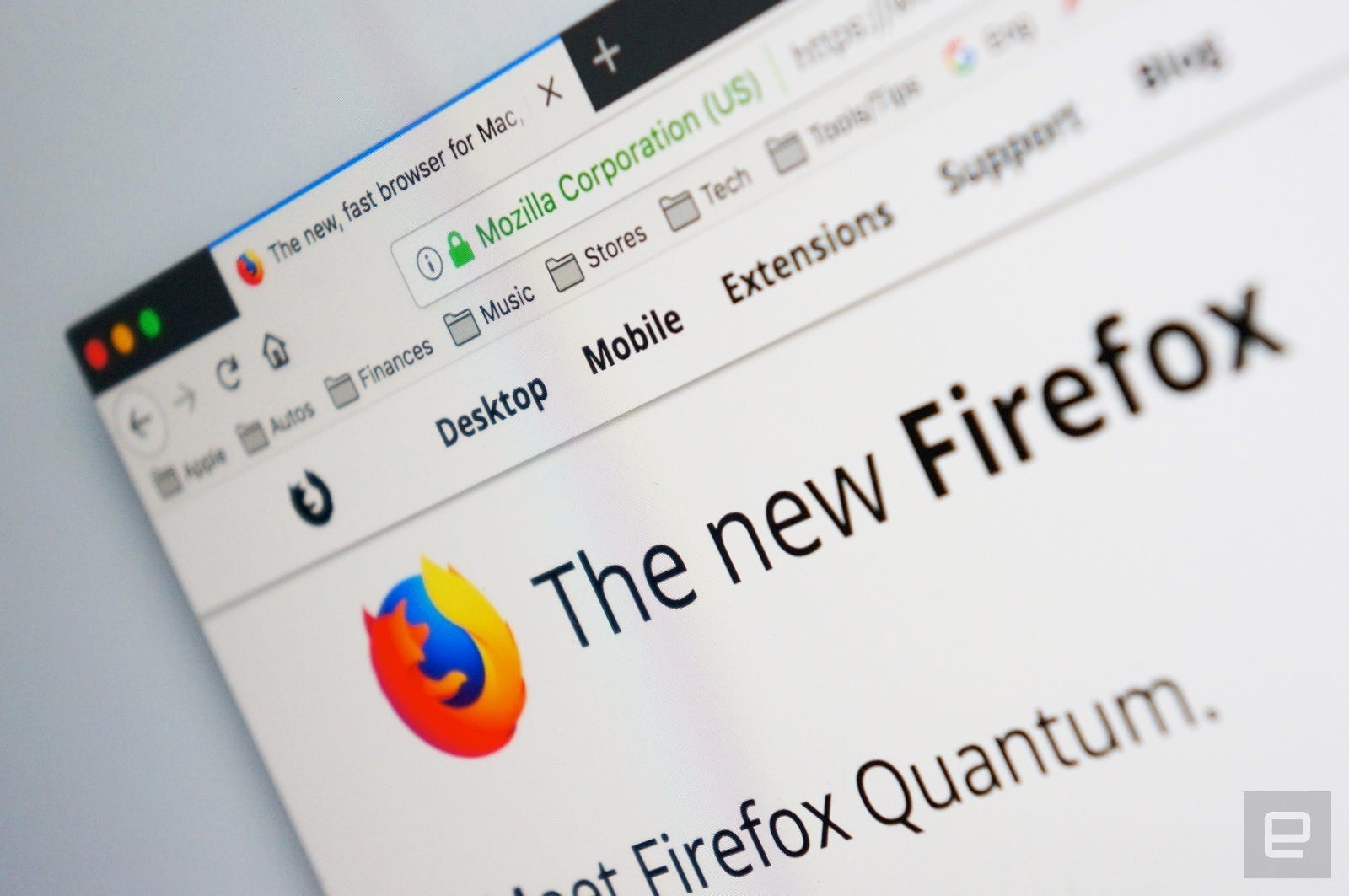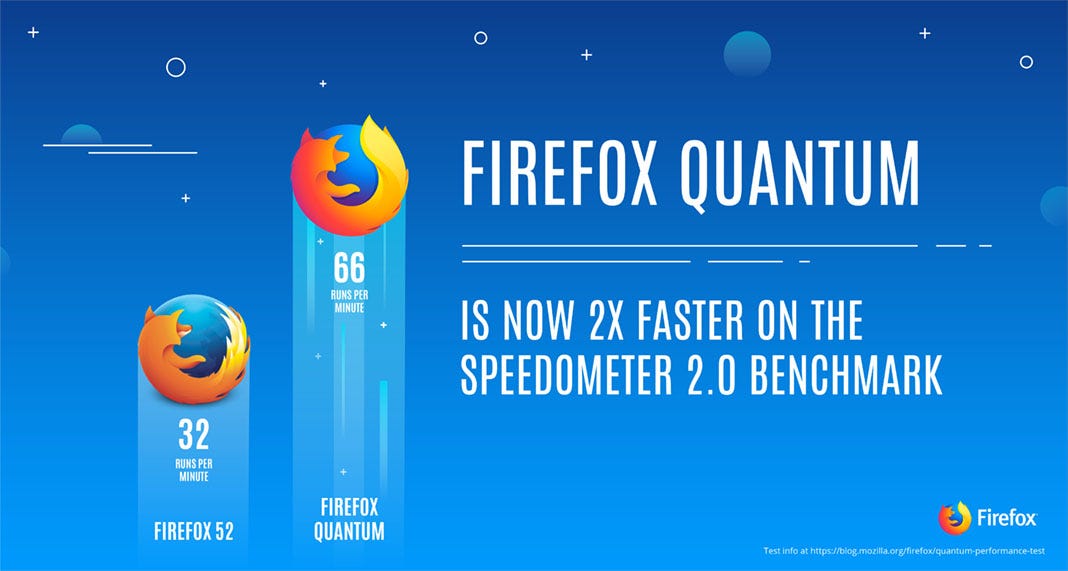I ran a simple experiment. These are the results.

Chrome
has had a lock on the market for a long time. Like most people, it’s
been years since I’ve even considered changing browsers.
But
when Firefox Quantum came out a couple months ago, I was surprised by
how much hype and marketing came with the launch. Mozilla were making
some tantalizing promises about their new browser.
I’m
in favor of giving new apps a shot. Maybe it’s because I like it when
others do the same for my work. So, I decided I’d run a simple
experiment. I’d use Firefox Quantum for a few weeks and see if it was
worth the minor hassle of a browser switch.
The experiment
I’m
a tech guy, so a lot of my work and life is inside a browser. I was
willing to run an experiment, but I laid down a few rules:
- I would only convert if Firefox was better than Chrome.
- In order to make clear comparisons, I would regularly switch back and forth between the two.
- I would take notes along the way to track how things were going.
- I would try to keep an open mind, both towards Google and Mozilla.
For the information, I have a Mid-2014 MacBook Pro, 15-in, 2.5 GHz Intel Core i7, 16 GB RAM.
Now, on to the findings.
The Good

Browsing speed
This
is something Mozilla has touted, so I’ve been paying attention. I don’t
think I have come across any of my regularly–visited websites where
Firefox is slower. It feels just as fast or faster than Chrome.
The speed improvements are not absolutely mind-blowing, but they are noticeable, and that’s enough.
More direct control over privacy
My
tin foil hat is more the size of a yarmulke than a sun hat. It makes me
slightly uncomfortable knowing how much information Google has about
me, but I’m not too bent out of shape about it.
Regardless
of the maker of the browser, Firefox gives me more nuanced control over
how much data I hand off to companies. I believe this is a good thing,
for both me and the web audience in general.
Dev tools
For
my elementary purposes, I’d say the dev tools are a little better than
Chrome’s. I like the Style Editor, the tabs in the sidebar of the
Inspector, etc. React Developer Tools is available in Firefox, too.
Resource usage
As far as I’ve been able to tell, the difference in resource usage between Firefox and Chrome is significant.
There
are some telltale signs that Chrome is pulling harder on my machine,
even with only one open tab. For example, sometimes there’s some lag
when transitioning to my open Chrome window; with Firefox, everything is
always smooth. When I use Chrome, I’ve noticed my fans kick on more
often and my battery seems to drain faster.
I
have a decent computer with plenty of RAM, but this has been one of my
favorite parts of using Firefox so far. There’s a clear feeling that it
just takes fewer resources to run. I love knowing that when I bring up
my browser every day.
Built-in screenshotting
I use screenshots on a regular basis, and the built-in screenshot
feature is wonderful. I can’t find a single Chrome extension that’s as
simple and well-made, with just the right kind of features.
UI feels snappier
Compared
to Firefox, Chrome sometimes feels a little sluggish or laggy. I’m not
sure if this is because Firefox uses less processing power or because
it’s coded better (or both), but I suppose it doesn’t matter.
Firefox Quantum is always fluid and snappy.
Supports Mozilla
I
need functionality in a browser as much as the ability to support a
good organization. Thankfully, with Firefox, I don’t have to give up one
to get the other—I get both.
Mozilla is a great organization that does a lot of stuff to make the web a better place. Anyone who’s reading this article should be happy with that.
The Same
Extensions
I
know this is a deal breaker for some, but I’m not a huge extension
user. The few I do use are all available on Firefox Quantum.
Visual design
Side
note: this is only in reference to the visual design of the UI, not the
user experience as a whole. Visual design is important, but it’s not
the only factor in UX.
This
is a matter of personal preference. I would say stock Chrome has a
better visual design than stock Firefox. But I made some custom changes
to things that were bugging me with a userChrome.css file (below) and
now I’m calling it even.
Now, it’s really just a series of trade-offs.
The Bad
Mobile
The
Firefox mobile app is not terrible. I actually like some things, like
the navigation on the bottom. But to me, Chrome’s mobile app feels a
little more polished.
On iOS, I’ve found that more apps have the option to open links in Chrome. Only a select few allow that with Firefox.
Google Hangouts
Hangouts doesn’t currently work in Firefox.
Edit:
Several people told me that this has very recently been fixed in v58
(beta). I tested it and that appears to be true — it worked for me.
Auto-fill addresses and credit cards
These
aren’t available to everyone right now. Full availability is coming in
v58, so I solved this by moving to Firefox Beta. Others may not want to
do that.
I’ll actually probably stick with Beta even after v58 comes out.
The Verdict
I’ve been surprised by the results of my experiment.
Honestly,
I didn’t have much hope for Firefox. I was excited to try something
new, but I didn’t expect it would be good enough to warrant a change.
I’ve been proven wrong.
Firefox is now my main browser. And I’ve been really happy with it.
If you’re anything like me, switching to Firefox might be the right thing, too.
 Source
Source

No comments:
Write comments